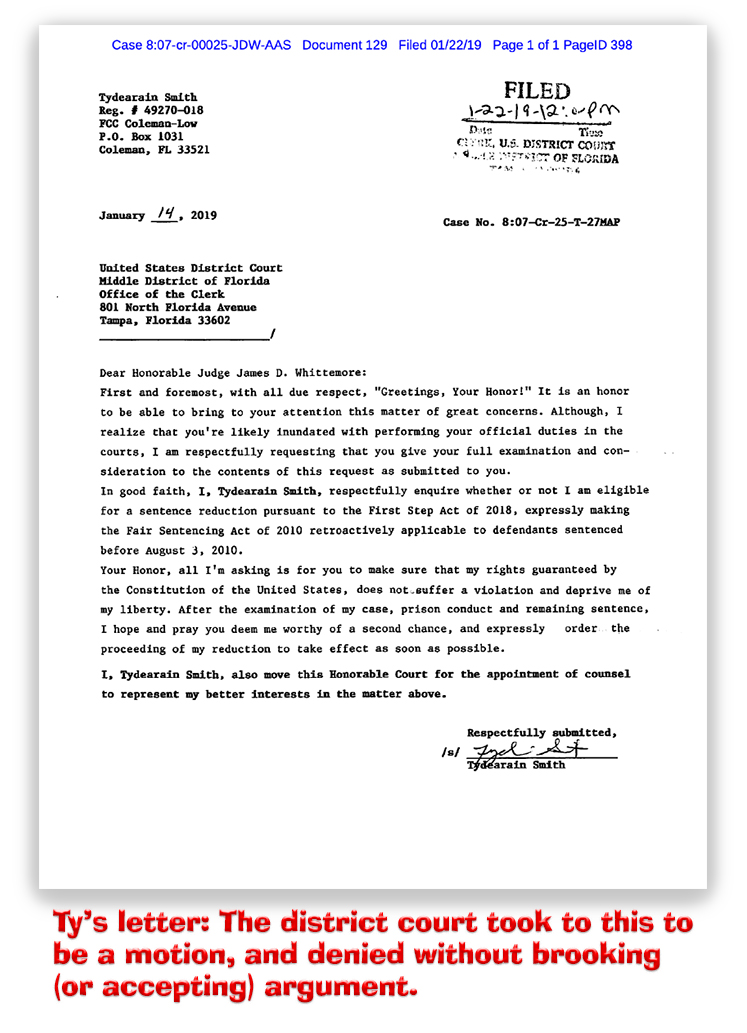We post news and comment on federal criminal justice issues, focused primarily on trial and post-conviction matters, legislative initiatives, and sentencing issues.

SANDBAGGING NOT ALLOWED
 Reading this case, I could not help but recall a Firesign Theater “Nick Danger” skit in which the crusty private eye was interrogating a suspect, with questions delivered in machine-gun fashion: “Where were you on the night of the 14th? Shut up! Won’t talk, eh?”
Reading this case, I could not help but recall a Firesign Theater “Nick Danger” skit in which the crusty private eye was interrogating a suspect, with questions delivered in machine-gun fashion: “Where were you on the night of the 14th? Shut up! Won’t talk, eh?”
OK, I’ve dated myself. Big deal. Were he a baby boomer instead of a Gen-X’er, Tydearain Smith would know what I mean.
Ty, convicted in 2008 of possession of over 5 grams of crack and brandishing a firearm during a drug trafficking crime, was partly into his 293-month sentence when he wrote a very short letter to his district court. All he wanted to know was whether he was eligible for a sentence reduction under Section 404 of the First Step Act (the retroactive Fair Sentencing Act). If so, TyHe just wanted appointment of an attorney, and did not argue he was eligible for the reduction or explain why – if he was – he should get a sentence cut.
The district court construed Ty’s pro se letter as a Section 404 motion. Without asking Ty or the government to brief the issue, the court denied the letter motion as moot, concluding that Ty was not eligible for a reduction.
 Ty and the public defender both filed for reconsideration. The district court ordered the government to file a response to the motions for reconsideration, “including all substantive arguments.” Instead, the government, Ty and the PD jointly filed a motion asking that a briefing schedule be set so that everyone could argue all “substantive legal and factual arguments for relief.”
Ty and the public defender both filed for reconsideration. The district court ordered the government to file a response to the motions for reconsideration, “including all substantive arguments.” Instead, the government, Ty and the PD jointly filed a motion asking that a briefing schedule be set so that everyone could argue all “substantive legal and factual arguments for relief.”
The court denied the joint motion and ordered the government to respond as originally directed. It did so, arguing Ty was ineligible for relief.
The district court denied the motions for reconsideration. It again concluded that Ty was ineligible for Section 404 relief because the Guidelines ranges he had faced at sentencing had not changed. But then the court alternatively ruled that, even if Ty were eligible for relief, a “further reduction [was] not warranted” because he had lied at trial, brandished a gun, stipulated to 94% pure crack, and had already benefitted from the 2011 and 2014 Guidelines two-level reductions.
Last week, the 11th Circuit reversed the case, holding that district courts cannot sandbag parties like that. Before acting on its own initiative, a court must accord the parties fair notice and an opportunity to present their positions. A complete denial of the opportunity to be heard on a material issue, the Circuit said, is a violation “of due process which is never harmless error.”
 Here, Ty did not have any chance to present arguments in support of his request for a Section 404 reduction. “The wide berth given to district courts by the First Step Act requires deferential review with respect to the ultimate exercise of discretion,” the 11th said, “but it does not speak to the process which must be provided to the parties… A party must have his day in court.”
Here, Ty did not have any chance to present arguments in support of his request for a Section 404 reduction. “The wide berth given to district courts by the First Step Act requires deferential review with respect to the ultimate exercise of discretion,” the 11th said, “but it does not speak to the process which must be provided to the parties… A party must have his day in court.”
United States v. Smith, Case No 19-13056, 2022 U.S. App. LEXIS 10500 (11th Cir., Apr. 19, 2022)
– Thomas L. Root

